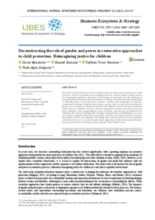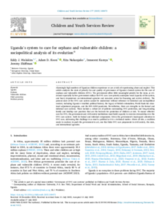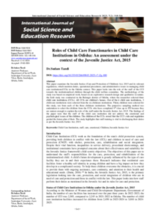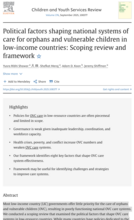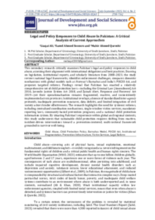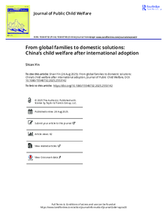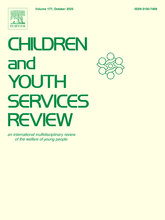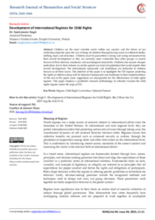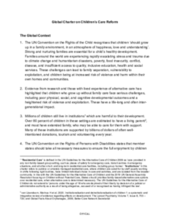Displaying 11 - 20 of 1794
This article presents a comparative analysis of the Czech Republic and Colombia’s implementation of the United Nations Guidelines for Alternative Family Care. Based on secondary data, it identifies a shared adherence to the UN framework; a strong Czech system for alternative caregivers’ selection, training and support; a deep ethical commitment of Colombian foster families to ensure children’s well-being, despite limited resources; and the relevance of supporting parents at risk of having their children removed from their care and integrating the effects of unplanned migration into alternative care strategies.
This article examines how gendered power dynamics influence restorative approaches to child protection, showing that traditional practices can marginalize children, especially girls and gender-diverse individuals. It highlights the potential for restorative justice to be transformed into a more inclusive and equitable system that addresses harm while challenging systemic power imbalances.
Alarmingly high numbers of Ugandan children experience or are at risk of experiencing abuse and neglect. This article analyzes the state of priority for and quality of governance of Uganda’s formal system for the care of orphans and vulnerable children (OVC).
This paper examines the Juvenile Justice (Care and Protection of Children) Act, 2015, and its regulations in the context of child care institutions (CCIs) in Odisha, focusing on the role of CCI staff in supporting institutionalized children through the child welfare committee. Findings from a qualitative study of three children’s homes in Balangir district indicate that staff often fail to address children’s emotional and psychological needs, highlighting the importance of staff training to effectively fulfill duties under the Juvenile Justice Act.
This article reviews the political factors shaping orphan and vulnerable children (OVC) care systems in low-income countries, highlighting weak governance, limited political commitment, and heavy dependence on external actors. It introduces a social science–based framework of eight key factors—spanning policymaking, governance, and context—to guide research and strengthen OVC care systems.
This study reviews Pakistan’s legal and policy responses to child abuse, noting that while comprehensive laws exist, enforcement remains fragmented and inconsistent across provinces. It calls for systemic reforms—including centralized coordination, victim-centered services, mandatory reporting, and stronger prevention measures—to move from reactive responses toward a sustainable, multi-sectoral child protection framework.
China’s decision to end its international adoption program after 30 years affects over 160,000 children, many with disabilities, raising concerns about increased institutionalization and developmental risks. This commentary highlights the need for reforms such as expanding domestic adoption, improving foster and kinship care, enhancing institutional quality, and strengthening cross-sector collaboration to create a more family-centered child welfare system.
This special issue of the Children and Youth Services Review concerns the governance of children's care systems in low and middle-income countries, with a focus on Cambodia, Uganda and Zambia. The special issue focuses on the political and bureaucratic factors that shape priority for and the effectiveness of national children's care systems in low and middle-income countries.
This paper critically examines the international child rights regime under the auspices of the United Nations, highlighting its historical foundations, key challenges, and the role of global institutions in safeguarding children’s rights. Employing a qualitative research methodology, the paper also offers recommendations to strengthen the effectiveness of child rights protections worldwide.
In January 2025, U.K. Foreign Secretary David Lammy launched an initiative to transform the lives of all children globally, so that they are cared for in families and free of violence, exploitation and other harmful practices.
The Global Charter on Children’s Care Reform is a call for world leaders to act together to: uphold the UN Convention on the Rights of the Child and the UN Convention on the Rights of Persons with Disabilities; invest in families, children, care leavers, and inclusive services; and end violence against children and harmful practices like orphanage tourism.


